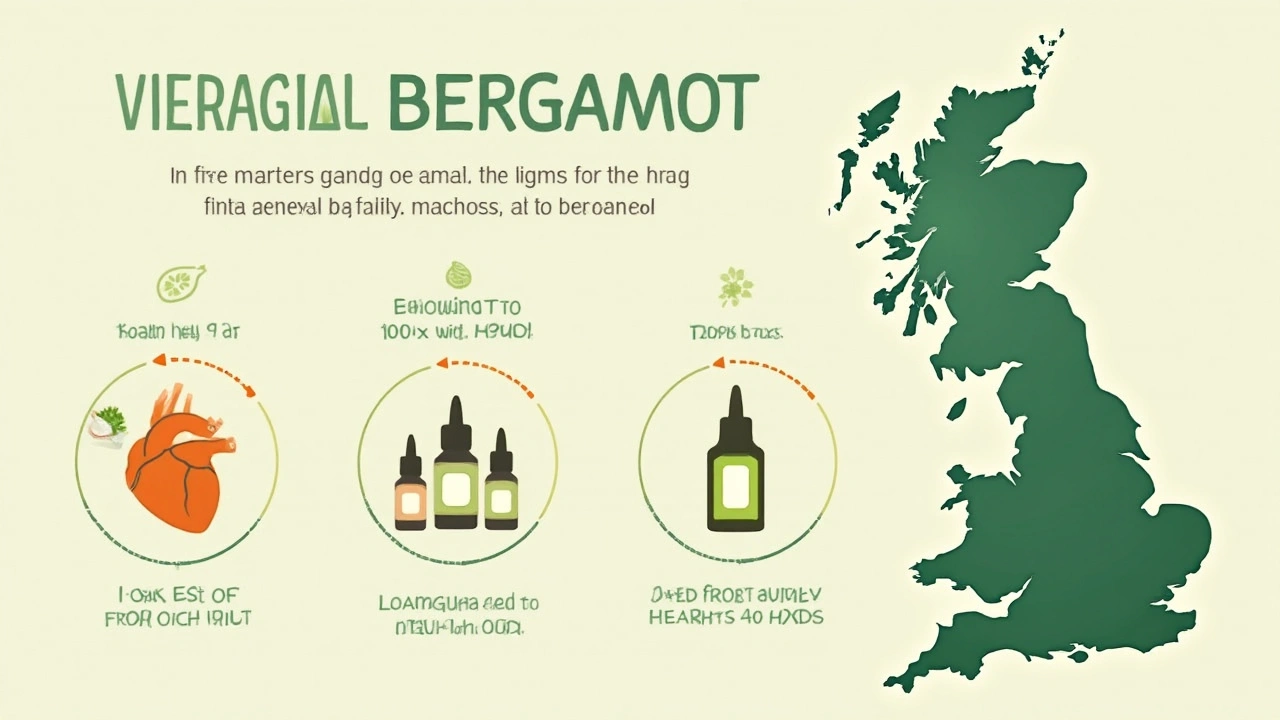You’ve probably seen "bergamot" on a fancy tea label, but you might not know it’s also blowing up in the supplement world. So, what’s the big deal? This citrus fruit, mainly grown in Calabria, Italy, packs a punch that goes way beyond flavor. People talk about it for supporting healthy cholesterol levels and helping with heart health—stuff that actually matters day to day.
Thousands are reaching for bergamot supplements hoping to tackle stubborn cholesterol numbers or just get a shot of healthy plant compounds. But does it really work, and should you be jumping on the bandwagon? If you care about your heart or want to know whether piling one more pill onto your morning routine makes any sense, you’re in the right spot.
Let’s clear up what bergamot is, what it’s supposed to do, and how you might benefit—without any of the hype. It’s time to sift through the buzz and get practical about this Mediterranean secret.
- What Is Bergamot, Really?
- What Makes Bergamot Stand Out
- Bergamot and Your Heart: What Science Says
- How To Choose and Take Bergamot
- Smart Tips for Safe Use
What Is Bergamot, Really?
So, what exactly is bergamot? It’s not your basic orange or lemon. Bergamot is a funky-looking citrus fruit, kind of like a cross between a sour orange and a lime. Most of it is grown in the Calabria region in southern Italy. You might have tasted its zesty oil in Earl Grey tea, but the hype around bergamot as a dietary supplement comes from the whole fruit, especially the juice and peel.
This fruit isn’t something you just toss in a fruit salad—the fresh stuff is super bitter and sour. Most of the time, it’s processed into extract form for supplements. These supplements claim to bring the health benefits without forcing anyone to take a bite.
- Bergamot supplements usually come as capsules, powders, or liquid drops.
- The active compounds people care about are called polyphenols, especially flavonoids. These plant chemicals are what researchers believe give bergamot its effects on cholesterol and heart health.
- Bergamot extract is different from bergamot essential oil. Don’t mix these up! Essential oil is mainly used for aromatherapy and shouldn’t be swallowed.
Here’s a quick look at how bergamot compares to other citrus superstars:
| Citrus Fruit | Main Use | Bitter Level | Top Benefit in Supplements |
|---|---|---|---|
| Bergamot | Supplements, tea flavoring | Very high | Cholesterol support |
| Lemon | Cooking, drinks | Low | Vitamin C boost |
| Orange | Snacking, juice | Low | Immune support |
Most bergamot supplements use the juice or dried fruit to pack in those healthy plant compounds. If you’re reading labels, look for Calabrian origin—it’s considered the gold standard for quality.
What Makes Bergamot Stand Out
So why are people suddenly talking about bergamot like it's the next big thing for your health? It mostly comes down to the unique mix of natural compounds inside this citrus fruit, especially flavonoids. These are plant chemicals known for serious health benefits, and bergamot has them in spades.
If you compare bergamot to other citrus fruits, it blows them away in concentration of these helpful flavonoids. One of the biggest stars is brutieridin, a compound that specifically helps block cholesterol production—think of it as a natural tool for fighting those stubborn numbers your doctor nags about. Besides cholesterol, bergamot flavonoids are known for fighting oxidative stress, which is a fancy way of saying they help protect your cells from everyday damage.
- High in unique flavonoids (brutieridin and melitidin)
- Contains antioxidants that help reduce cell damage
- May reduce LDL ("bad") cholesterol while raising HDL ("good") cholesterol
- Natural citrus source—no artificial extras
Some supplement makers even brag that bergamot supplements can lower LDL cholesterol by 25-35 mg/dL in just a month, according to studies on actual people, not just test tubes. Here’s a simple look at what sets bergamot apart compared to other common fruits:
| Fruit | Key Compounds | Main Benefit |
|---|---|---|
| Bergamot | Brutieridin, Melitidin, Antioxidants | Cholesterol, Heart Health |
| Orange | Vitamin C, Hesperidin | Immune Support |
| Lemon | Vitamin C, Flavonoids (lower) | Digestion, Colds |
You won’t find brutieridin or melitidin in oranges or lemons. That’s why bergamot supplement labels love pointing to their clinical edge.
Another thing that’s cool about bergamot? It works without the side effects of typical cholesterol meds like statins. People who get muscle aches or cramps from statins sometimes turn to bergamot dietary supplements as a friendlier option. Always check with your doctor first, but it explains why this citrus extract is showing up in every health store lately.

Bergamot and Your Heart: What Science Says
If you’re dealing with high cholesterol or just trying to keep your heart in good shape, bergamot has probably popped up on your radar. But what does the research actually show?
First off: researchers in Italy—where most of the world’s bergamot is grown—ran trials to see if bergamot supplements could help lower LDL (bad cholesterol) and boost HDL (good cholesterol). Here’s something interesting: a 2023 published study followed 237 people with mildly high cholesterol. Those taking a daily bergamot dietary supplement for 6 months saw an average LDL drop of 22% and an HDL rise of nearly 10%. That’s not magic, but it’s definitely something you notice on your blood tests.
So, why does it work? Scientists pin the benefits on specific plant compounds in bergamot—especially polyphenols like brutieridin and melitidin. These help block cholesterol production in the liver, which is similar to what popular statin drugs do (but in a milder way). The bonus: a lot of folks tolerate bergamot better than statins, with fewer complaints about muscle pain and fatigue.
It’s not just about numbers, either. Early studies looking at markers for artery stiffness and blood vessel health suggest adding bergamot to your daily routine could help arteries stay flexible—a huge deal for lowering your risk of heart problems as you age. Of course, it won’t replace healthy eating or regular exercise, but it’s a useful piece of the puzzle.
Check out this roundup of some recent study results:
| Study Year | Participants | LDL Reduction | HDL Increase | Supplement Duration |
|---|---|---|---|---|
| 2023 | 237 adults | 22% | 10% | 6 months |
| 2021 | 78 adults | 18% | 7% | 3 months |
| 2018 | 94 adults | 19% | 6% | 4 months |
No supplement is a miracle cure. Still, these numbers make the case that bergamot can give your heart a fighting chance. When you’re working with your doctor, bringing up bergamot as a potential add-on (not a replacement for meds) is a smart move.
How To Choose and Take Bergamot
So you’re ready to try bergamot as a dietary supplement, but the options can get confusing fast. There’s fruit extract, capsules, powders, and even teas with bergamot oil. Not all these give you the same health kick, though. The key ingredient to look for is "bergamot polyphenolic fraction," sometimes just called "BPF." This is where most of the heart-helping power comes from. The best supplements will usually list the standardized amount of BPF, typically in milligrams, right on the label.
Dosage matters. In most studies looking at cholesterol and heart health, people took between 500 and 1500 mg of standardized bergamot extract per day. You’ll usually see this split as one dose in the morning and one at night, with or without food. Don’t expect instant results—a lot of folks see cholesterol changes after about 4 to 8 weeks.
| Supplement Form | Average Daily Dose | Notes |
|---|---|---|
| Capsule | 500-1500 mg | Easy for most people; check for polyphenol content |
| Powder | 500-1000 mg | Can mix in smoothies; taste is citrusy and bitter |
| Tea/Oil | Usually not enough for heart benefits | Great for flavor, but doesn’t pack the same punch |
When shopping, watch out for products that hide behind fancy packaging but don’t tell you how much real bergamot extract you’re getting. If you can’t find the standardized BPF amount, keep looking. Quality brands will show third-party lab tests (look for a QR code or details on the website), so you actually know what you’re putting in your body.
Here’s a quick checklist before adding bergamot to your routine:
- Check for at least 500 mg of standardized bergamot polyphenols per day
- Avoid teas or essential oils if you’re looking for real supplement effects
- Stick to brands that show lab test results and clear ingredient info
- If you’re on meds, especially for cholesterol or blood pressure, talk to your doctor to avoid unwanted interactions
Most people handle bergamot well, but starting with a lower dose is a good idea if you’re sensitive to new supplements. Keep track of any side effects, like tummy issues or headaches, and adjust as needed. Everybody’s different!

Smart Tips for Safe Use
Using bergamot isn’t tricky, but you do need to be smart about it. First up, always check the label—every supplement is different. Some brands use pure bergamot extract, others add extra stuff. Look for clinically tested doses, usually around 500-1,000 mg daily. This range comes up a lot in research on heart health and cholesterol.
If you’re already taking meds for cholesterol or blood pressure, play it safe. Talk to your doctor before adding bergamot. Mixing it with certain drugs, especially statins, could mess with how your body breaks them down. Same goes for folks with diabetes—bergamot may lower blood sugar a bit, so watch for symptoms like feeling shaky or weak.
- Start with the lowest dose listed on your supplement. You can increase if you’re not seeing any side effects after a week or two.
- Take it with food—this helps your body absorb the plant compounds better and may cut down on stomach upset.
- Store the supplement in a cool, dry spot away from sunlight. Bergamot oils and extracts can break down if they get too hot.
There aren’t a ton of side effects, but sensitivity varies. Some people have reported mild stomach pain, headache, or cramps. If you feel weird after taking it, stop and check in with your healthcare provider.
| Potential Side Effect | How Common? | What To Do |
|---|---|---|
| Stomach upset | Occasional | Take with food, lower the dose |
| Headache | Rare | Hydrate, see if it passes |
| Muscle cramps | Very Rare | Stop use, see doctor if it persists |
Last thing—if you’re allergic to citrus, steer clear of bergamot altogether. And remember: supplements won’t replace eating well or seeing your doctor. They’re just another tool, not a miracle fix.


Graham Holborn
Hi, I'm Caspian Osterholm, a pharmaceutical expert with a passion for writing about medication and diseases. Through years of experience in the industry, I've developed a comprehensive understanding of various medications and their impact on health. I enjoy researching and sharing my knowledge with others, aiming to inform and educate people on the importance of pharmaceuticals in managing and treating different health conditions. My ultimate goal is to help people make informed decisions about their health and well-being.